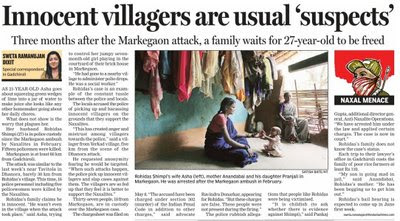VJAS urged UPA Govt. start non-GM food crop promotion policy to protect National Health, Environment and Ecology- Demand Special Incentive to subsidies ‘Zero Budget Organic Farming ’In farm suicide effected districts in
Nagpur-31st may 2009
New UPA Govt. with fresh mandate to govern the nation is starting it’s second term with more liberty to take firm decision but history of more than 1,00,000 farmers suicides mostly in 31 district of India which were declared as farm suicide effected district and special prime minister relief package Rs.40.000 crore followed by Rs.71,000 crore loan waiver was given to tackle agrarian crisis ,can not be forgotten more over suicide of distress farmers in farm suicide prone district is till continued and fresh debt is mounting on the farmers due to crop failure and non-sustainable farming methods .
It is understood that new UPA Govt. is giving special priority to food security and problem of poverty and hunger will be the main focus of economic agenda of new Govt. but basic reason of agrarian crisis in the country is the aggressive high cost and high risk cash crop farming with the help of G.M.(Genetically Modified) seed (in case of cotton it’s Bt.cotton seed) coupled with very toxic chemical farming which has already damaged to our forest wealth ,soil fertility and ecological balance of India hence in order to save our country from toxic food and complex health problems being imported along with Genetically Modified Seed ,VJAS has urged Indian Prime Minister Dr.Manmohan Singh to start new agrarian policy to promote Non-GM Food Crop Promotion Policy with special incentives and subsidies to farmers who are adopting ‘Zero Budget Organic Farming ’in farm suicide effected districts in India, Kishore Tiwari president Vidarbha Janandolan Samiti (VJAS) informed in press note today.
VJAS has urged UPA Govt. ban commercial trials of all GM seeds because of it’s adverse reports of public health, environment and forest degradation are reported and evolution of toxicity of chemical and Genetically Modified Foods and vegetables is very much needed when it is banned in most of part of developed world .when developed countries are promoting organic farming for public health, it is completely unfair and unjust to allow poisonous food and vegetable in our country in name of food security ,poverty and hunger.
UPA Agriculture Minister Sharad Pawar who is also food supply minister has very special interest in MNCs having monopoly in GM seed and agro-chemical manufacturing due to his wasted financial interest which is known to everybody in India hence country is at the risk of having more in flow of commercial trials of GM foods and vegetables and if toxic and poisonous seeds are not banned then in next five year, our food would be too toxic to eat and damage to our public health ,soil and forest will be so disastrous that country will not be able repair hence VJAS has humble request to Indian Prime Minister Dr.Manmohan Singh to start non-gm food crop promotion policy to protect national health,environment and ecology and give special incentive to subsidies ‘zero budget organic farming ’in farm suicide effected districts in India
Please arrange to release this press note
Vidarbha Jan Andolan Samiti
contact-09422108846





